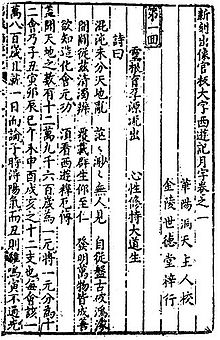Monkey: A Folk-Tale of China, more often known as simply Monkey, is an abridged translation by Arthur Waley of the sixteenth century Chinese novel Journey to the West by Wu Cheng'en of the Ming dynasty. Originally published in 1942, it remains one of the most-read English-language versions of the novel.
Plot

At the outset of the novel, Buddha seeks a pilgrim who will travel West, to India. The hope is to retrieve sacred scriptures by which the Chinese people may be enlightened so that their behaviour may accord with the tenets of Buddhism. The young monk Tripitaka volunteers to undertake the pilgrimage. Along the way, he encounters and frees the Monkey King, and he and Monkey thereafter recruit Pigsy and Sandy. They liberate a captive princess and punish her abductor, who has also murdered her father. The father is resurrected and reinstalled as king. They meet several bodhisattvas and fight fierce monsters, before finally arriving at Buddha's palace.
Translation

Arthur Waley's abridged translation was published in 1942, and has also been published as Adventures of the Monkey God; and Monkey: [A] Folk Novel of China and The Adventures of Monkey, and in a further abridged version for children, Dear Monkey. Whereas previous abridged versions of Journey to the West retained the original number of chapters but reduced their length significantly, Waley adopted the opposite approach; he translated only 30 chapters out of 100 episodes, but did so nearly in full, omitting mainly the poetry. He is also responsible for inventing the names of the main characters: Sun Wukong as "Monkey"; Xuanzang, as "Tripitaka"; Zhu Bajie as "Pigsy"; and Sha Wujing as "Sandy."
Journey to the West may be roughly divided into three parts: first, the introduction including the origin of Monkey, Tripitaka, Pigsy, and Sandy; second, the actual journey to the west, which has an episodic nature; and last, the ending, telling what happens when the pilgrims reach their destination. Waley chose to translate the entirety of the introductory and ending chapters, as well as three episodes, each several chapters long, of the journey to the west.
Influence

Waley’s translation was for many years the most popular translation of Journey to the West available in the English language and therefore cited by Western scholars of Chinese literature and appreciated by Western readers. The British poet Edith Sitwell characterized Monkey as “a masterpiece of right soundâ€, one that was “absence of shadow, like the clearance and directness of Monkey’s mind.†Professor of Chinese literature David Lattimore described it as a “minor landmark of 20th-century English translationâ€, though adding that it had been overtaken as the most authoritative English edition with the publication of Anthony C. Yu’s four-volumes, unabridged translation published in the late 1970s and early 80s by the University of Chicago Press. Elaine Yee Lin Ho in her study of the British writer Timothy Mo says Monkey remains “the most popular and textually accessible translation†of Journey to the West.
The literary scholar Andrew H. Plaks has voiced reservations. Waley's "brilliant translation," he points out, not only shortened the work, but "through its selection of episodes gave rise to the misleading impression that this is essentially a compendium of popular materials marked by folk wit and humor." In this, Waley consciously followed the interpretation put forth earlier in the century by the scholar Hu Shih, who wrote an introduction to the 1943 edition of Waley's book. Hu scorned the allegorical interpretations of the novel as old-fashioned and instead insisted that the stories were simply comic. Hu Shih's interpretation reflected the popular reading of the novel, but does not account for the levels of meaning and the allegorical framework which scholars in China and the west have shown to be an important part of the late Ming text.
Waley's translation was also in its turn re-translated into other languages, e. g. into Swedish as Kung Markatta. 1949.
See also
- Wu Cheng'en
- Journey to the West
References

